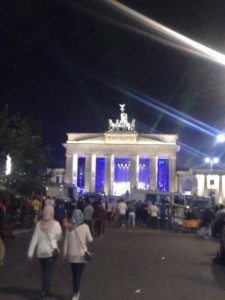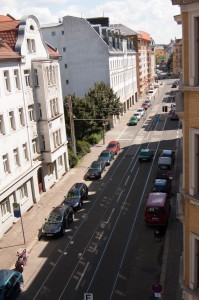A show of nationalism is still viewed with suspicion.
By Sabil Francis
BERLIN, GERMANY: A century after the First World War started, three quarters of a century after the Second did, and a quarter century after the Berlin Wall came down, Germany’s 1-0 victory in the World Cup, the first by the united Germany, is symbolic. The ghosts of the past have been laid to rest, and with its economic power, a new and assertive Germany emerges from the shadows. Yet, any show of nationalism is still viewed with deep suspicion here.

Unlike most nations where winning the World Cup football would be celebrated as victory in a major war, Germans are still hesitant to equate sporting triumphs with national victories. A day after the World Cup, few flags adorn the streets. There is no sense of euphoria. On Monday morning, Germans went about their business, as if nothing had changed. Of course, Berlin’s Fan Mile, on Straße des 17. Juni, between Brandenburg Gate and the Siegessäule, the German equivalent of the Champs-Élysées in Paris, is awash with flags, but beyond, they are few and far between.
In the city of Leipzig, in the east, a solitary car scuttled along, with the flag attached to the roof. On a train between Leipzig and Berlin, only a few adorned sun lit balconies in spite of the triumph. Waving the flag has to catch on. Jan Hoffman who works in an NGO in Frankfurt and came to cheer the team at the fan mile in Berlin, was in New York when 9/11 happened. “I had never seen so many flags in my life. Here, there are hardly any though we won football’s greatest tournament. It is as if we still must give ourselves permission to wave the flag,” he says. Not every nation in Europe shares a similar reluctance. Swedish homes, for example, often have the country’s yellow blue flag, familiar to anyone who has visited an IKEA shop, waving in the breeze in the courtyard.
In Germany, given its unfortunate history, the flag is rare. In fact, there is a rueful tolerance of people waving other flags even as Germany plays crucial matches. In the eastern city of Leipzig, when Germany played Brazil most German fans were tense, fearing the South American giant’s football prowess. Yet there were Brazilian fans in the city’s cafés. They evoked little anger. “You wave the flag of where your heart is, not where you live. And flags change,” says Dietmar Lang, who was two when the war ended, grew up in the DDR, and now lives in an united Germany raising a glass of Leipzig’s local beer, the top fermented Gose, one of the few beers in Germany, which does not follow the German Beer Purity Law. The law, dating back to 1516, allows only water, barley and hops to be used in the production of beer.
At the Brandenburg gate, for the Final, the same concern that Germany be not seen as a victorious hegemon was evident. Fans chanted “Super Deutschland! Super Deutschland!” a relatively neutral slogan compared to the chilling “Deutschland uber alles,” or “Germany, Germany above all,” the first stanza of the “Das Lied der Deutschen” or “The Song of the Germans,” the national anthem of Germany since 1922. That stanza that has not been sung after 1945. The German suspicion of anything that hints at the superiority of the nation runs deep.
Even those born after 1990 feel the same. “For me, the German win is not like we defeated the rest of the world. Just that we are the best in football,” says 21-year-old Lukas Dietrich who is an active member of the Deutscher Fussball Bund (German Football League) and sported the green t shirt of its members. The League is key to the German victory. After finishing at the bottom of its group in the Euro 2000, in a bid to encourage younger players, the government poured money in the DFB. Dietrich had travelled all the way from Dortmund to the famous Berlin fan mile to watch the final. “I am German and in school we are taught the history of the war and the Holocaust. That is very important, but still to me, it seems so far away. However, I don t believe in nationalism. I would never die for Germany,” he grins.

In any other country in Europe, with the possible exception of Austria, heir to a similar history, it would have been different. Simon Agresti is the perfect judge. Agresti, an Italian from Rome who moved to Leipzig to work as a Marketing and Communications specialist and celebrated Italy’s win in 2006, joined yesterday’s celebrations in Berlin. He says, “In 2006, every square in Rome was filled with people singing. Everyone was crazy. In Italy at the start, not everyone supports the national team, but later, if they win, everyone jumps on the winning truck,” he smiles. The celebrations in Rome had a triumphant note. “We were inventing songs, especially insulting the French. We have always lost on penalties to the French. For us it was like a liberation.”
In contrast, most parts of Berlin were deserted. The after party was at the Brandenburg gate. By 3 AM, Alexanderplatz, the one of Berlin’s main squares, was deserted. A few diehard fans, many of them English, waved the German flag and lustily sung drinking songs. “A job efficiently done, and now back to work,” was how Jan Hoffman, a student at the university of Leipzig, put it.
Cultural factors, too, play a role. “The Germans are too serious. If we had a victory, even on a Sunday evening, we would not even go to work on Monday. We just went crazy. And the party lasted into the night everywhere.” says Agresti. However, more than cultural factors, at the heart is a deep ambivalence of waving the flag. “Waving the flag was something that you never did after the war. It was only in 2006, when Germany hosted the World Cup, that a few people began to do it. Even then, it was not widely adapted. And even today, even as Germany emerges from the shadow of the Second World War and the Cold War, I don’t think that there will ever be a time when Germans go back to a jingoistic frame of mind,” says Christina Jang, who studies history at the Freie University, Berlin.
A century ago, from the balcony of the Royal Palace in Berlin, Kaiser Wilhelm II, who could have demanded peace, called for war. Dismissing the divisions between the German people, he proclaimed: “When it comes to war, all parties cease and we are all brothers. Let your hearts beat for God, and your fists on the enemy.” Four years later, Germany was in turmoil and the Kaiser abdicated. Some historians assert that it was the German blank cheque to Austria that made a squabble between the Austro Hungarian Empire and Serbia, a World War. Pictures from the era show German soldiers marching through the Banderberg Gate, the lane awash with flags. Yesterday, once again there were many flags. The meaning was very different. For the Germans yesterday’s victory merely meant, to translate the German word “weltmeister” literally, they were world masters in football. Nothing more. (Global India Newswire)




1 Comment
Thanks for this! A really good article, I live in Darmstadt near Frankfurt and this is true in this city too. I think Germans don t see it as a victory of Germany but as a victory of the football team. I think other news outlets have just copy pasted the victory celebrations of other countries without trying to look deep into the German psyche. This is one article that has done that.